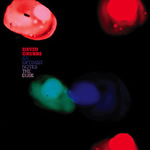|
|
 |
Dusted Reviews
Artist: David Grubbs Album: An Optimist Notes the Dusk Label: Drag City Review date: Sep. 22, 2008 |

|
|
|
 |
It’s hard for an optimist these days. The current swarm of crises that plague our nation are enough to shake even the most upbeat of believers, supplanting lofty ambitions with frightening realism. Our economy’s in the shitter, energy prices are absurd, we’re fighting two wars abroad with multiple other avenues for potential conflict, and Earth sure isn’t getting any cooler. It’s not a point of contention whether or not the glass is half full; the real debate lies with what the hell we’re gonna do with the water that’s in it.
By title alone, An Optimist Notes the Dusk appears parallel to such sentiments of pragmatic recognition, though the terms are instead focused inward. It’s the first solo full-length from avant-rock icon David Grubbs in four years, veering from the increasing accessibility of his past Drag City releases with a much dimmer tone. Gone are the country-rock meanderings and wide-eyed charm of 2004’s A Guess At Riddle – Grubbs’ most song-oriented effort to date. On Optimist, Grubbs trades the verse-chorus structures and jaunty vibes for slithering guitar compositions and a pervasive air of eeriness. The approach isn’t without precedent in Grubbs’ vast body of work (especially among his more experimental output on his own Blue Chopsticks imprint), but stands in stark contrast when compared to his other lyric-based records. Most distinctly, Optimist conveys a somber maturity and doleful outlook where youthful exuberance once stood.
It’s unclear whether or not the Optimist is Grubbs himself, but such an assumption is certainly not unwarranted. Though he’s been reluctant to admit the degree of correlation between his music and personal life in past interviews, it’s difficult not to position Grubbs within his songs when they resonate so intimately, drawing direct reference to specific time and location. “Eyeglasses of Kentucky” is a prime example, dedicated to “pride of place” and declaring “This is Lexington. This is 1971.” The song is actually a tribute to the late photographer Ralph Eugene Meatyard, though Grubbs paints a picture of Kentucky life gone by that seems particularly wistful.
The words ring bleakly throughout the entire album, conveying uneasy anticipation and private vexation. “Could you let yourself go?” asks Grubbs in “An Optimist Declines” – a cutting question that serves as the record’s focal point. The vocal abstractions ride on his slippery fretwork with an awkwardness that fans have become familiar with by now, but the effect seems even more pronounced when supported by Optimist’s minimal instrumentation. The album’s six tracks are incredibly spacious but sharp, their sprawling contemplation expressed through powerful fragility. “Holy Fool Music” is the record’s only rock-oriented hat tip, but exhibits hardly a trace of the cheerful acoustics showcased on 2000’s The Spectrum Between. The gnarly guitar and sinister tone are more reminiscent of Gastr del Sol’s Crookt, Crackt, or Fly, though not as jagged in design or broad in scope.
Optimist reads much like a concept record, maintaining its mood lyrically and musically as it progresses. Grubbs establishes connections from track to track, harping solemnly on age and death through metaphorical allusions to night and knives. It all culminates in “The Not-So-Distant” – a 12-minute piece of monstrous bass growls that bring to mind Oren Ambarchi’s recent guitar compositions. The track even touches on the chilling drones from Grubbs’ 2007 collaboration with poet Susan Howe, growing to a brooding climax before acquiescing into the black.
Though it may lack the immediate appeal of Grubbs’ more hook-oriented solo records, Optimist leaves a lingering impact through the weight of its content. At the very least, it stands as one of his most compellingly poetic works – a sober challenge for the daydreamers of today.
By Cole Goins
|







